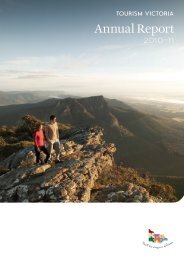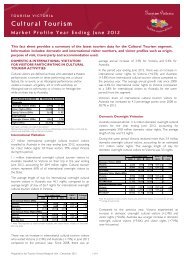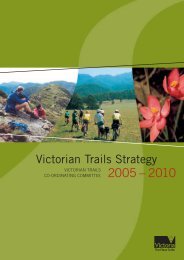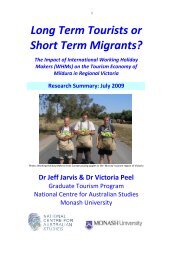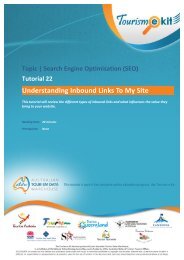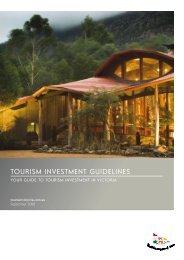Crisis Communications Handbook for Regional ... - Tourism Victoria
Crisis Communications Handbook for Regional ... - Tourism Victoria
Crisis Communications Handbook for Regional ... - Tourism Victoria
Create successful ePaper yourself
Turn your PDF publications into a flip-book with our unique Google optimized e-Paper software.
Restoring Consumer Confidence<br />
The most crucial and urgent requirements of a region’s tourism recovery plan are to restore consumer<br />
confidence and to raise awareness that the impacts of the crisis or incident have either been contained<br />
or completely resolved.<br />
Key steps to take and principles to follow include:<br />
1. Establish industry credibility<br />
2. Determine all the facts<br />
3. Consider the sensitivities<br />
4. Accurately gauge outside perceptions<br />
5. Assess extent and tone of media coverage<br />
6. Consult affected industry stakeholders<br />
7. Explore availability of financial assistance<br />
8. Determine budget <strong>for</strong> recovery phase<br />
9. Define key messages<br />
10. Address negatives head-on<br />
11. Stay flexible<br />
12. Agree on the most cost-effective communications option/s<br />
13. Implement coordinated recovery strategy<br />
14. Measure success of campaign<br />
15. Refine campaign as necessary<br />
As discussed earlier, when a crisis occurs, the region’s recovery process should begin immediately by portraying<br />
the local tourism industry’s response as being upfront, authoritative and timely.<br />
Constructive media relations are the key to addressing misperceptions, and will ensure that the region’s<br />
marketing ef<strong>for</strong>ts are not contradicted by negative stories. Smart use of the media can also be far more<br />
cost-effective than relying solely on advertising and other marketing activities.<br />
Consideration should be given to engaging professional media liaison services.<br />
Once established as a reliable and credible source of in<strong>for</strong>mation, the industry will find the media and other<br />
observers far more receptive to subsequent messages that the region is ‘open <strong>for</strong> business’ and ready <strong>for</strong> visitors.<br />
Following the initial response, the next step is to fully assess the situation and gather as many facts as possible<br />
so that the process of relaunching the region is realistic and properly in<strong>for</strong>med.<br />
Assisted by expert and up-to-date operational advice, the TRRG will then be in a position to determine the<br />
timing and content of its communications activities during the recovery phase.<br />
Naturally, all in<strong>for</strong>mation used in media releases, briefings, fact sheets, advertising and marketing ef<strong>for</strong>ts must<br />
be accurate and consistent, although emphasis will obviously vary.<br />
CRISIS COMMUNICATIONS HANDBOOK FOR REGIONAL AND LOCAL TOURISM 28




